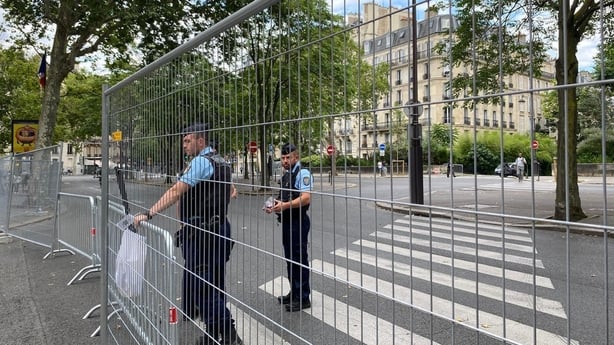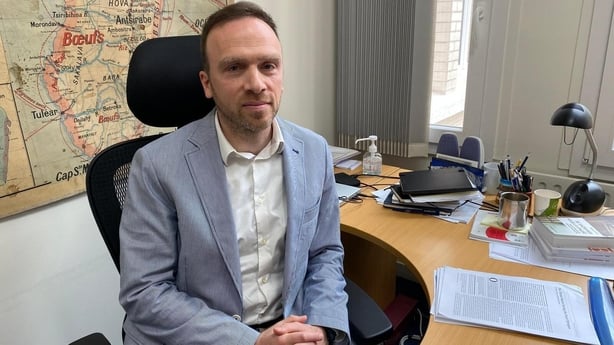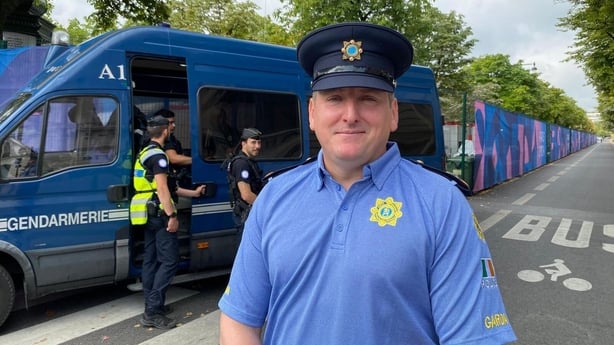The organisers of the Paris Olympics have promised an "unprecedented" security operation in the city ahead of the official start of the games later this week, and indeed the signs are everywhere in the heart of the French capital.
Officials have said more than 45,000 police officers are being deployed, while a 6km anti-terrorism barrier has been erected along the banks of the River Seine ahead of the opening ceremony.
Police checkpoints and metal barriers are now a familiar sight in central Paris, while the enormous police deployment means an officer is never more than a few hundred feet away.
Rarely in peacetime has Paris experienced such high levels of security.
Friday's ceremony poses a particular challenge for authorities.
Unlike previous summer Olympics, it will not take place inside a stadium - instead, a flotilla of barges will carry thousands of athletes down the River Seine.

To keep participants safe, France will impose a no-fly zone of 150km during the ceremony, while snipers will be deployed on the top of buildings along the route.
Access to the Seine within that 6km route has now been blocked off to anyone without a special pass or QR code to enter.
"For as long as the closing ceremony hasn't finished, we need to remain vigilant," Tony Estanguet, president of the Paris 2024 Organising Committee, said earlier this week.
"Security is our number one priority for Paris 2024," he added.
According to Marc Hecker, a security analyst at the French Institute for International Relations, the main security threats facing Paris ahead of the Olympics come from "jihadis and other terrorist groups from the far right," while nonviolent activists also pose a challenge to the smooth running of the games.
Authorities are particularly stringent about cybersecurity, amid concerns that hackers will attempt to access information from the main France 2024 system.

Despite those security challenges, Mr Hecker believes Paris is ready.
He said: "They've been preparing for years now, and it will be an amazing deployment of security forces for several weeks.
"There will be around 45,000 policemen and gendarme for the opening ceremony, plus more than 10,000 soldiers and 20,000 private security officers.
"The idea, of course, is to maximise the protection, and to minimise the risk. Of course, you cannot annihilate the risk.
"There will always be one. But the idea is not to accept defeat against terrorism by abandoning this magnificent setting."
We need your consent to load this rte-player contentWe use rte-player to manage extra content that can set cookies on your device and collect data about your activity. Please review their details and accept them to load the content.Manage Preferences
Around 1,000 officers will be on duty to protect Israel's football match against Mali, meanwhile, where protests are expected, French Interior Minister Gerald Darmanin said.
Gardaí assisting in security operation
And it is not just French security personnel who will be on patrol in Paris over the coming weeks.
A total of 56 garda officers will also be deployed to France for the Olympic and Paralympic Games.
Garda inspector Neil Casley said gardaí will also assist in policing in some tourist areas following a request received from French authorities and subsquent Government approval.

He told RTÉ's Morning Ireland: "Garda officers in Paris will be partaking in joint patrols with French police and will be available to assist Irish nationals or other English-speaking nationals attending Olympic events.
"Specifically, there will be three types of missions that may be assigned to garda officers.
"These are assuring public security, assisting to welcome visitors and facilitate engagement with local host authorities, and ensuring transport security in train stations and metro stations near Olympic venues."
Latest stories from Paris 2024
Mr Casley said garda members will be based around all central locations in Paris.
"We'll have teams in the ninth district, 11th district, 15th district and also up in the Stade de France stadium," he added.
We need your consent to load this rte-player contentWe use rte-player to manage extra content that can set cookies on your device and collect data about your activity. Please review their details and accept them to load the content.Manage Preferences
Additional reporting AFP



